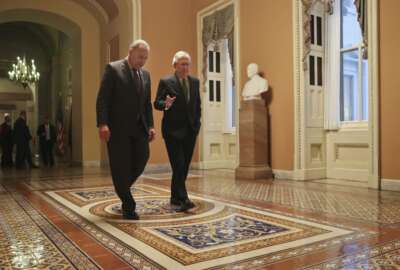This story has been updated Friday, Feb. 9 at 9:00 a.m. to reflect that the president has signed the bill.
Subscribe to Federal Drive’s daily audio interviews on iTunes or PodcastOne.
President Donald Trump signed a two-year spending agreement and six-week continuing resolution into law Friday morning, effectively ending a nine-hour government shutdown.
The bill’s passage comes after Congress missed its deadline and did not pass a new budget solution before the clock struck midnight Friday.
Though Congress closed and then ultimately cleared a path for the government to reopen early Friday morning while many federal employees were still asleep or just waking up, it was the second lapse in appropriations in less than four weeks.
Senate initially missed the midnight deadline. Members returned to the Senate floor at 12:01 and passed the Bipartisan Budget Act of 2018 with a 71-28 vote more than an hour later.
The House passed the spending agreement with a 240-186 vote, after members returned to the floor for a series of votes and debate at 3 a.m.
With the president’s signature, the Office of Personnel Management updated its operating status.
“Agencies are strongly encouraged to use all available workplace flexibilities to ensure a smooth transition back to work for employees (e.g. telework, work schedule flexibilities, and excused absence for hardship situations),” OPM said.
Thursday night’s delays came from Sen. Rand Paul (R-Ky.), who held up votes over his concerns with a $300 billion spending boost included in the two-year Bipartisan Budget Act of 2018.
Hours before the midnight deadline, the Office of Management and Budget had told agencies to begin notifying employees and preparing for a lapse in appropriations, should Congress fail to pass a two-year budget deal by midnight.
“OMB is currently preparing for a lapse in appropriations,” an agency official said in an email Thursday night. “As we stated earlier today, we support the Bipartisan Budget Act and urge Congress to send it to the president’s desk without delay.”
Reps. Don Beyer (D-Va.) and Rob Wittman (R-Va.) had prepared their now customary legislation that would guarantee back pay for federal employees in the event of a government shutdown.
The Federal Employee Retroactive Pay Fairness Act must be tailored to address each specific possible lapse in appropriations, a spokesman for Beyer’s office confirmed. The bill has 95 cosponsors and was included in the three-week continuing resolution Congress passed to reopen the government after three-day partial government shutdown last month.
Yet all told, Congress kept up uncertainty for about five-and-a-half hours early Friday morning. Lawmakers will move on immigration and border security negotiations next week.
President Donald Trump, meanwhile, is expected to release his fiscal 2019 budget proposal Monday. In a statement offering his support for the Bipartisan Budget Act, Trump hinted at proposals to come that will likely offer more spending reductions for non-defense agencies.
“It is critical that the Congress work to decrease non-defense spending in other areas to reduce America’s growing national debt,” the Office of Management and Budget wrote in a statement of administrative policy. “The Bipartisan Budget Act provided non-defense discretionary spending levels higher than the administration deems necessary. Additionally, although the Bipartisan Budget Act does include some spending reductions, the administration has proposed hundreds of billions of dollars in additional spending reductions that the Congress should also enact without delay in order to improve our fiscal state.”
Budget deal brings some (temporary) certainty to feds
The Bipartisan Budget Act, which had support from both Senate Majority Leader Mitch McConnell (R-Ky.), Minority Leader Chuck Schumer (D-N.Y.), House Speaker Paul Ryan (R-Wis.) and the White House, would set spending caps for the next two years. It would set the spending limit for defense agencies at $629 billion in fiscal 2018 and $647 billion in fiscal 2019, while domestic agencies would be authorized to spend no more than $579 billion and $597 billion this year and the next.
But unlike previous two-year spending deals, the 2018 bill contains relatively few offsets, worth about $100 billion. Those offsets will come from higher customs, aviation security and certain immigration fees.
The passage of the spending bill should bring some relatively good news to federal employees, many who have long feared that lawmakers would again would use their retirement benefits to offset significant spending increases in another two-year deal.
After all, Congress has used previous two-year, bipartisan budget deals to set higher federal employee contributions. The Bipartisan Budget Act of 2013 required that new federal employees hired after 2013 contribute 4.4 percent toward their retirements.
But at 652 pages, the 2018 budget act makes no mention of the federal workforce and its retirement system.
“With the release of a two-year budget deal, federal employees and retirees receive some much-needed relief,” National Active and Retired Federal Employees Association President Richard Thissen said Thursday in a statement. “Relief from the continuing threat of another government shutdown. Relief from austerity-level budget caps and the threat of sequestration. And most importantly, relief from knowing that their earned pay and benefits will not be targeted to pay for an increase in the budget caps.”
Copyright
© 2024 Federal News Network. All rights reserved. This website is not intended for users located within the European Economic Area.
